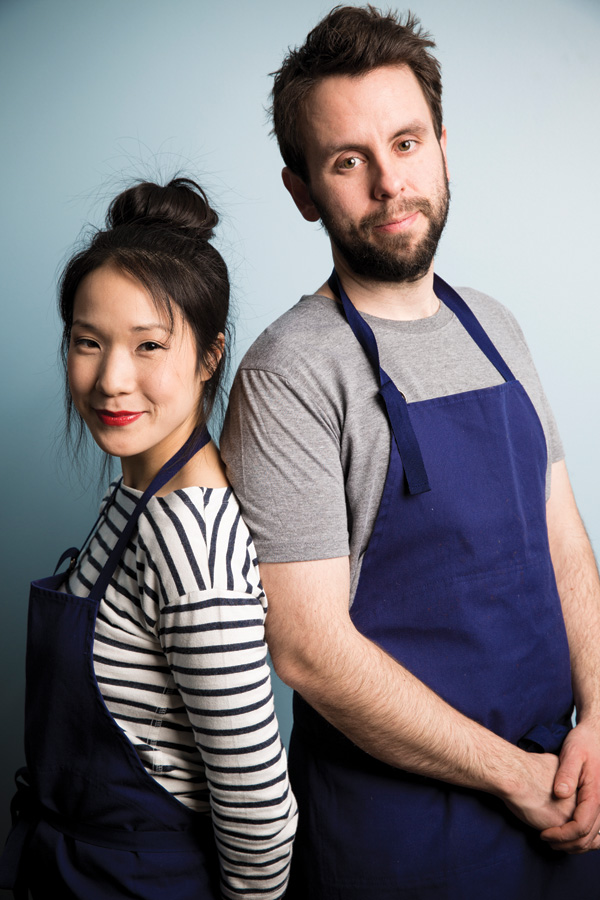by JAMIE MORGAN
As Beverly Kim and her husband and chef-partner Johnny Clark mark the one-year anniversary of Parachute, the Chicago restaurant they opened last May, the Korean American half of the pair recalls a trying moment in Seoul in 2006 that tested her professional mettle.
The chef’s apprentice, then 26, decided to visit Korea after surviving a car accident. After realizing how fleeting life could be, she set out to find fulfillment.
“I hadn’t ever picked up my bags and left my hometown of Chicago to find inspiration,” Kim says in a recent interview with KoreAm. “I always wondered whether Korea was where you could find inspiration, so I went for it.”
And she went big. Once arriving in Seoul, Kim approached kitchen management at the luxury, high-end Shilla Hotel to inquire about any culinary training opportunities.
“I actually just went to the head chef and said, ‘I want to work here,’ in my broken Korean,” Kim says. “I told him, ‘I want to work here and learn more about Korean culture and food, and I’ll work for free, if you don’t mind, for a couple of weeks.’”
“And he said, ‘Sure, why not?’” Kim recalls. “It was very nice of him.”
Yet not everyone shared in her excitement. Kim’s American pluck won her the honor of being labeled a naghasan, or parachute, by one of her Korean co-workers. The word has the connotation of an elitist who makes their way to the top based on connections. The nickname left Kim feeling less than top notch, but her husband, years later, encouraged her to turn the negative memory into a positive one.
“That name stuck with me,” Kim says. “When I told my husband that story, he said that should be the name of our restaurant. We looked it up, and in English, it means ‘free-flowing’ and ‘safe from falling.’”
Based on its skyrocketing popularity, it seems Parachute really is safe from falling. The husband-and-wife duo, whose individual expertise in Korean cooking brought them together, has been getting shout-outs from all over town for their Korean-influenced modern American menu.
 The restaurant’s intimate 40-seat space features brick walls, homemade light fixtures and window drapings fashioned from a parachute.
The restaurant’s intimate 40-seat space features brick walls, homemade light fixtures and window drapings fashioned from a parachute.
In late March, the intimate 40-seat restaurant was named just one of seven finalists for Best New Restaurant in the U.S. by the 2015 James Beard Foundation Awards. Chicago Magazine called Parachute “one of 2014’s most promising newcomers” while the restaurant’s Chinese-inspired bing bread appetizer—pan-fried bread studded with potato, bacon, cheddar and scallions—has its own cult following and a Bon Appetit tested-and-approved recipe for home chefs.
Three years ago, the outlook looked a lot different for the Clarks. The couple was put in charge of the menu at Chicago’s now-shuttered Bonsoiree, where they introduced their unique brand of Korean-tinged fare. The effort was short-lived: after only two months, the couple quit and the restaurant closed.
 Parachute’s famous bing bread appetizer
Parachute’s famous bing bread appetizer
To see the couple bounce back with Parachute, a darling of Chicago’s increasingly diverse food scene, is a testament to the challenges Kim has stared down over the years as a fiercely determined chef; don’t underestimate her knack for proving naysayers wrong.
As a culinary student at Chicago’s Kendall College in the late 1990s, Kim was defending her use of distinct Korean flavors in her dishes to skeptical teachers. Years later, the school called upon the alumna to come and teach its next generation of chefs. As a contestant on Top Chef Season 9, Kim faced a humiliating round of kitchen bullying by a fellow competitor, only to outlast her detractor and return for a few episodes as winner of the Last Chance Kitchen challenge.
These days, the biggest challenge for Kim seems to be figuring out how to manage the crowds Parachute draws. When it opened last year, seating was first-come, first-served. But as word spread and the restaurant faced two- and three-hour waits for tables during dinner service, Kim and Clark were left with no other choice but to institute a reservation system, which began in November.
“We were really scared about it at first,” says Kim, 35. “We didn’t want the image of being this sort of hoitytoity, really formal kind of place, but it’s actually worked out really, really well. People really appreciate it.”
Customers can also appreciate Parachute’s casual, no-frills environment. It’s housed in a space that used to be a Mexican bakery. Located in the Avondale neighborhood, a historically Polish community on Chicago’s northwest side, the restaurant has a charming authenticity to it. Brick walls, a shelf made from vintage speakers, homemade light fixtures and window drapings fashioned from a parachute all lend the restaurant a unique feel.
 Parachute’s Scallop dish with broccoli, promelo and ginger
Parachute’s Scallop dish with broccoli, promelo and ginger
The price point of Parachute is pretty welcoming, too. Starter dishes range from $3 to $10 and entrees from $10 to $36. Parachute’s food is meant to be shared, such as the spicy beef marrow and crab broth hot pot with silken tofu, mussels, head-on prawns, squid and fennel, which is enough for two to four people.
Kim and Clark, who are parents to a toddler son, almost exclusively use local ingredients in their cooking; their love of seasonal produce means guests can look forward to an ever-changing menu. Parachute allows simple ingredients to shine, such as a scallop dish with broccoli, pomelo and ginger, or tempura-fried sesame leaves served with a bourbon-barrel soy dipping sauce. The more Korean-centric items on the menu are given a new spin, such as kalbijim paired with rice cakes, cipollini onions and rutabaga, or dolsot bibimbap with brown rice, chicken, maitake mushroom, chestnuts, truffle and duck egg.
 Tempura-fried sesame leaves served with a bourbon-barrel soy dipping sauce
Tempura-fried sesame leaves served with a bourbon-barrel soy dipping sauce
“The soul of the restaurant is Korean-inspired, but we like to be more creative than just a traditional Korean restaurant, especially with our backgrounds in other cuisine,” Kim says. “You go to the West coast and there’s so much Asian-influenced cuisine out there, but I think in Chicago, there’s still a need for more.”
Kim’s love of Korean food started early: She grew up watching and helping her mother cook meals from scratch in the Chicago suburb of Downer’s Grove. Clark’s formal introduction to Korean cuisine, meantime, was in 2008 when the Cincinnati native and Culinary Institute of America graduate trained at nature-focused restaurant Sandang, outside Seoul, under the chef Yim Gi-ho. As KoreAm detailed in a Nov. 2013 story, the couple met after Clark, 34, chanced upon a magazine profile of Kim, then the executive chef at Aria restaurant in the Fairmont Chicago, and emailed her his resume.
The couple hired architect Charlie Vinz under a modest $200,000 budget to cover the costs of Parachute’s construction, equipment, furniture, rent, utilities and labor. And although food is the focus, it’s not the only thing that running a restaurant requires. On the brisk day KoreAm visited the restaurant, Clark was busy installing a fire door. The sound of drills and hammers competed with the clanging of pots as the kitchen staff prepped for the next day’s menu.
While the Home Depot runs and maintenance work represent a new reality for the chefs, Clark says it’s worth enduring to live a life doing what they both love. “The reward is being happy at what you’re doing and making money doing it. I think that’s what everybody wants, right?” he told KoreAm back before Parachute opened, in 2013.
Doing what they love and pushing the boundaries of creativity: these are the true propellers behind the couple’s success as they continue to lift Parachute to even greater heights.
___
This article was published in the April/May 2015 issue of KoreAm. Subscribe today! To purchase a single issue copy of the April/May issue, click the “Buy Now” button below. (U.S. customers only. Expect delivery in 5-7 business days).











